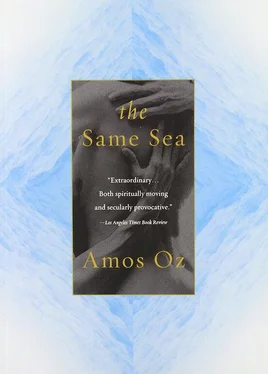How would I like to write?
Like an old Greek who calls up the dead and shakes up the living. Or like
a snowman passing alone and barefoot. To record the mountain to note
the sea with a fine tip, like sketching out a pattern for embroidery.
To write like a Russian travelling merchant making his way from here
to China. He finds a shack. And sketches it. In the evening he looks,
in the night he draws, and he finishes before dawn. Then he pays and
goes on his way with the break of day.
Like an open fracture like a broken bone sticking out of the torn flesh, my
mother rises in the night from the shadow on the ceiling, saying to me Amek
its two o'clock why aren't you asleep and why are you smoking again. Go
to the kitchen child drink some warm milk then get back into bed and sleep.
Don't think about me in the night I am insomnia think instead about foggy
rain in the forest and a fox seeking shelter among fir trees in the dark and it
will lull you to sleep. In the dark among the fir trees Old Somnia walks
with a wet headscarf sodden dress soaked to the skin a crooked stick in her
shrivelled hand a weary witch named Somnia roams in the dark in the rain
lost in the foggy trees shuffling from shadow to shadow wandering away
from me out there yet passing through me on her way, backwards and
forwards, criss-crossing me like a valley that she has turned from a valley
into a vale of tears with her sleepless wandering. Maybe all this is just because
I have left some door flapping.
Give me five minutes to try to sort out this screwed-up business. People are
constantly being ditched. Here in Greater Tel Aviv for example I bet
the daily total of ditchings is not far short of the figure for burglaries.
In New York the statistics must be even higher. Your mother killed herself
and left you quite shattered. And haven't you yourself ditched any number
of women? Who in turn had ditched whomever they ditched in favor of you,
and those ditched guys had certainly left some wounded Ditchinka lying
on the battlefield. It's all a chain reaction. OK, I'm not saying, I admit
being ditched by your own parents is different, it bleeds longer.
Specially a mother. And you an only son. But for how long? Your whole life?
The way I see it being in mourning for your mother for forty-five years is
pretty ridiculous. It's more than ridiculous: it's insulting to other women.
Your wife, for instance. Or your daughters. I find it a turn-off myself.
Why don't you try and see it my way for a moment: I'm twenty-six and you'll
soon be sixty, a middle-aged orphan who goes knocking on women's doors
and guess what he's come to beg for. The fact that before my parents
were even born your mother called you Amek isn't a life sentence. It's
high time you gave her the push. Just the way she chucked you. Let her
wander round her forests at night without you. Let her find herself
some other sucker. It's true it's not easy to ditch your own mother, so why
don't you stick her in some other scene, not in a forest, let's say in a lake:
cast her as the Loch Ness monster, which as everyone knows may be
down there or may not exist, but one thing is certain, whatever you see or
think you see on the surface isn't the monster, it's just a hoax or an illusion.
Ditch her, you say, it's easy for you to say it,
bail out like a fighter pilot ditching a plane
that's in a spin or on fire. But how can you jump from a plane
that's already crashed and rusted or sunk under the waves?
From out there, from one of the islands
This morning outside her window Bettine Carmel sees
grey rain, shutters, washtubs, puddles in a deserted backyard.
Between kitchen balconies bare clotheslines are strung.
Ugliness and beauty, Bettine reflects, both attest, or at least point,
to the existence of some invisible presence, a silent, awesome
presence of which they bring us neither the voice nor the echo
but only a shadow of a shadow. Where is the boat, Bettine?
Where are those islands you mentioned? Here there is only
a peeling back wall. Rusty shutters. Tin roofs. And rain
pouring down not in torrents but splat, splat: like pus. A bus
bursts puddles and throws up mud like a whale's spout.
Where are those islands, Bettine? When do we sail?
And where to? Avram's old toilet things have been standing
next to the basin in your bathroom for twenty-one years,
a stiffened shaving brush, a dried shaving stick and a blunt
razor, and out there among the garbage cans in the yard in all that rain
a wet cat writhes, wailing hoarsely with tormented desire.
Those islands you mentioned, Bettine, when you asked me
if I believed in them, the Invisible Carmel, a silent awesome
presence, instead of replying yes or no I cracked a joke. I
tossed you some vapid witticism because then, when you asked me,
I was simply not all there. There was no me at home in my head.
Now that I'm back in residence there is no need to ask me
if I believe or disbelieve in those islands because as of this moment
those islands are me and from out there, from one of the islands,
I am calling to you through the rain, You come too, Bettine.
There is definitely every reason to hope
Bettine, you come too. There's a meeting at Amirim Street about Nirit's Love ,
tea and coffee are being sipped, savory sticks nibbled. Dombrov is full of
words and Giggy Ben-Gal is picking his teeth. In a brass lamp in the shape of
a pomegranate all four bulbs are lit because the day is gloomy. The new
contract looks fair, but still Bettine rewords a clause, for the sake of clarity,
and Albert raises three questions and suggests a couple of minor changes.
Absalom in his head, Absalom, my son my son. In Bengal now it's five o'clock;
on the radio they said the Brahmaputra has flooded. Stay clear of the water,
my son. Keep away from low-lying areas. As for the Narrator, he is having
a whispered conversation with Dita at one end of the sofa, the script lying
across their laps. (Albert phoned him in Arad and asked him to read it, to
give his opinion, to come, if he could, to the meeting.) Two hundred yards
from here, the sea is having a whispered conversation with the sea, not
cracking jokes but trying on silver baubles, taking them off, putting them on,
polishing them, replacing emerald with lead. On the chair where Nadia used
to sit is a pile of coats, scarves, we were all afraid it would rain, so far it has
held off but it still looks threatening. Seemingly lit from within, clouds
are swept eastward to the mountains and on toward Bengal. There, in the
center of Dacca, in a corner of Cafe Mondial, Rico is waiting for two of the
Dutchmen whom he arranged to meet up with here when he last saw them
in Tibet. How is he to know that they've been in the Hague since the day
before yesterday? This coffee table, the chairs, the armchair, the sideboard,
were all made by Elimelech the carpenter some twenty years ago for a song
because he and Albert both came from Sarajevo, they were vaguely related
and had been school friends. Albert checked the carpenter's accounts
every year and filled out his tax return. That is an old story, long since over.
Читать дальше












